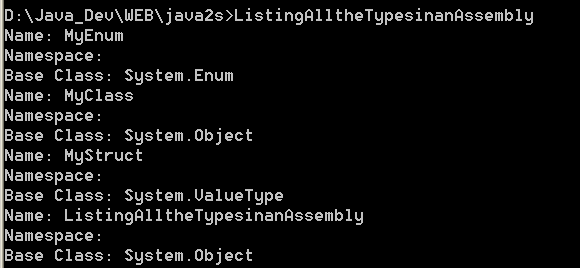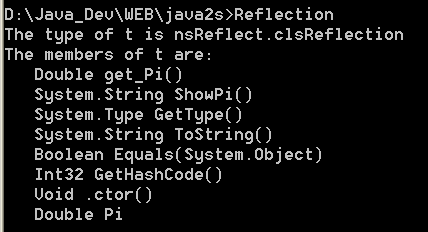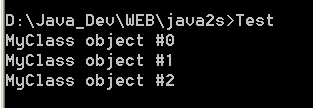Reflector
using System;
using System.Collections.Generic;
using System.Linq;
using System.Text;
using System.Reflection;
using System.Linq.Expressions;
using System.IO;
using System.Web;
namespace PK.Utilities.Reflection
{
public class Reflector
{
private delegate T ObjectActivator<T>(params object[] args);
/// <summary>
/// Create an instance from an object using reflection and linq expressions. Works for every constructor
/// </summary>
/// <typeparam name="T">The type of the object to instance</typeparam>
/// <param name="assemblyName">The name of the assembly who stores the type</param>
/// <param name="typeFullName">The fullname of the type to instanciate</param>
/// <param name="args">The arguments of the constructor</param>
/// <returns>An instance of the given type</returns>
public static T GetInstance<T>(string assemblyName, string typeFullName, params object[] args)
{
T res = default(T);
//var completeAssemblyName =Path.Combine(GetRunningPath(), assemblyName + (assemblyName.EndsWith(".dll", StringComparison.InvariantCultureIgnoreCase) ? "" : ".dll"));
Assembly assembly = Assembly.Load(GetAssemblyName(assemblyName));
Type type = assembly.GetType(typeFullName);
ConstructorInfo ctor = GetConstructor(args, type);
ObjectActivator<T> createdActivator = GetActivator<T>(ctor);
res = createdActivator(args);
return res;
}
private static AssemblyName GetAssemblyName(string assemblyName)
{
var name = new AssemblyName(assemblyName);
return name;
}
private static ConstructorInfo GetConstructor(object[] args, Type type)
{
if (args == null)
args = new object[0];
ConstructorInfo ctor = type.GetConstructor(args.Select(o => o.GetType()).ToArray());
return ctor;
}
/// <summary>
/// Create an instance from an object using reflection and linq expressions. Works for every constructor
/// </summary>
/// <typeparam name="T">The type of the object to instance</typeparam>
/// <param name="type">A Type object containing the object type to instantiate</param>
/// <param name="args">The arguments of the constructor</param>
/// <returns>An instance of the given type</returns>
public static T GetInstance<T>(Type type, params object[] args)
{
T res = default(T);
ConstructorInfo ctor = GetConstructor(args, type);
ObjectActivator<T> createdActivator = GetActivator<T>(ctor);
res = createdActivator(args);
return res;
}
/// <summary>
/// Create an instance from an object using reflection and linq expressions. Uses the default constructor.
/// </summary>
/// <typeparam name="T">The type of the object to instance</typeparam>
/// <param name="assemblyName">The name of the assembly who stores the type</param>
/// <param name="typeFullName">The fullname of the type to instanciate</param>
/// <returns>An instance of the given type</returns>
public static T GetInstance<T>(string assemblyName, string typeFullName)
{
return GetInstance<T>(assemblyName, typeFullName, new object[] { });
}
/// <summary>
/// Create an instance from an object using reflection and linq expressions. Uses the default constructor.
/// </summary>
/// <typeparam name="T">The type of the object to instance</typeparam>
/// <param name="fullTypeName">The string with full type name and asembly, in format "fullName, Assembly"</param>
/// <returns>An instance of the given type</returns>
public static T GetInstance<T>(string fullTypeName)
{
var values = fullTypeName.Split(new char[]{','}, 2 );
return GetInstance<T>(values[1].Trim(), values[0].Trim(), new object[] { });
}
/// <summary>
/// Creates an ObjectActivator specifyc for an object type and a constructor type
/// </summary>
/// <typeparam name="T">Type of the object to get an instance for</typeparam>
/// <param name="ctor">ContructorInfo containing detail information for an specicyc contrustor</param>
/// <returns>An delegate of the compiled ObjectActivator method</returns>
private static ObjectActivator<T> GetActivator<T>(ConstructorInfo ctor)
{
ParameterInfo[] paramsInfo = ctor.GetParameters();
//create a single param of type object[]
ParameterExpression param = Expression.Parameter(typeof(object[]), "args");
Expression[] argsExp = new Expression[paramsInfo.Length];
//pick each arg from the params array
//and create a typed expression of them
for (int i = 0; i < paramsInfo.Length; i++)
{
Expression index = Expression.Constant(i);
Type paramType = paramsInfo[i].ParameterType;
Expression paramAccessorExp = Expression.ArrayIndex(param, index);
Expression paramCastExp = Expression.Convert(paramAccessorExp, paramType);
argsExp[i] = paramCastExp;
}
//make a NewExpression that calls the
//ctor with the args we just created
NewExpression newExp = Expression.New(ctor, argsExp);
//create a lambda with the New
//Expression as body and our param object[] as arg
LambdaExpression lambda = Expression.Lambda(typeof(ObjectActivator<T>), newExp, param);
//compile it
ObjectActivator<T> compiled = (ObjectActivator<T>)lambda.Compile();
return compiled;
}
}
}
Related examples in the same category
| 1. | Call GetType() from StringBuilder | | |
| 2. | Call GetType for int data type | | |
| 3. | IsGeneric and IsGenericTypeDefinition | | |
| 4. | demonstrates both the instance and static GetType methods | | |
| 5. | Generic methods, like nongeneric methods, can be invoked dynamically at run time. | | |
| 6. | Type.GetGenericArguments and MethodInfo.GetGenericArguments: | | |
| 7. | Get Generic Type Definition | | |
| 8. | Query properties of a Type | | |
| 9. | Deeper Reflection:Listing All the Types in an Assembly | |  |
| 10. | Illustrates runtime type creation | | |
| 11. | The typeName parameter is a combination of the Assembly and Type names | | |
| 12. | Call static method GetType from Type to get the Type instance | | |
| 13. | Use GetCustomAttributes from Type to get custom attributes | | |
| 14. | Use Type.GetType to check the type of an object | | |
| 15. | Get object Type Name, UnderlyingSystemType, IsClass | | |
| 16. | Type.GetConstructors | | |
| 17. | Use Type.IsClass to check if a type is a class | | |
| 18. | Print Types | | |
| 19. | Determining the base classes and interfaces for a class. | | |
| 20. | Create Object from assembly name and class name | |  |
| 21. | Makes a shallow copy of the object to a different class type (inherits from the original) | | |
| 22. | Makes a shallow copy of the object | | |
| 23. | Get all methods from an object | | |
| 24. | Get Derivation from an object | | |
| 25. | The full name of the Array type | | |
| 26. | Change type | | |
| 27. | Does a given Type have a Default Constructor | | |
| 28. | Is it a Nullable Type | | |
| 29. | Is Value Type Unitialized Value | | |
| 30. | Get Type Unitialized Value | | |
| 31. | Is Object Unitialized Value | | |
| 32. | Is it a SubClass for another class | | |
| 33. | Convert type from initial Value | | |
| 34. | Returns all assemblies and their properties | | |
| 35. | Helper to display the "contents" of the Value Object | | |
| 36. | Get a public field value given its name | | |
| 37. | Deep Comparison two objects if they are alike. | | |
| 38. | Set the specified public field value of an object | | |
| 39. | Determine if a type is cloneable: either a value type or implementing ICloneable. | | |
| 40. | Provides a simple reflection based mapper to perform a Data Mapping between two types of objects | | |
| 41. | Represents type declarations: class types, interface types, array types, value types, enumeration types, type parameters, generic type definitions, and open or closed constructed generic types. | | |
| 42. | Gets the attributes associated with the Type. | | |
| 43. | Gets the type from which the current Type directly inherits. | | |
| 44. | Gets a value indicating whether the current Type object has type parameters that have not been replaced by specific types. | | |
| 45. | Gets the type that declares the current nested type or generic type parameter. | | |
| 46. | Gets a reference to the default binder. | | |
| 47. | Represents the member filter used on attributes. | | |
| 48. | Returns an array of Type objects representing a filtered list of interfaces implemented or inherited by the current Type. | | |
| 49. | Returns a filtered array of MemberInfo objects of the specified member type. | | |
| 50. | Gets the number of dimensions in an Array. | | |
| 51. | Searches for the members defined for the current Type whose DefaultMemberAttribute is set. | | |
| 52. | Type.GetElementType | | |
| 53. | Returns a Type object that represents a generic type definition from which the current generic type can be constructed. | |  |
| 54. | Searches for the interface with the specified name. | |  |
| 55. | Get types implementing Dictionary | | |
| 56. | Returns all the public properties of the current Type. | | |
| 57. | Type to string | | |
| 58. | Get Full Type String | | |
| 59. | Get class members | | |
| 60. | Is Type a primitive type | | |
| 61. | Find Method With One Parameter Of Type | | |
| 62. | Determines whether the current type is an implementation of the specified interface. | | |
| 63. | Returns equality with type conversion | | |
| 64. | Groups the utility methods that extracts the meta data of a type. | | |
| 65. | Type loader | | |
| 66. | Get Friendly Type Name | | |
| 67. | Recursively gets all generic type params in any given type definition. | | |
| 68. | Type Manager | | |
| 69. | Given an anonymous type | | |
| 70. | Type Normalizer | | |
| 71. | Run static/Instance method | | |
| 72. | Get Subclass | | |